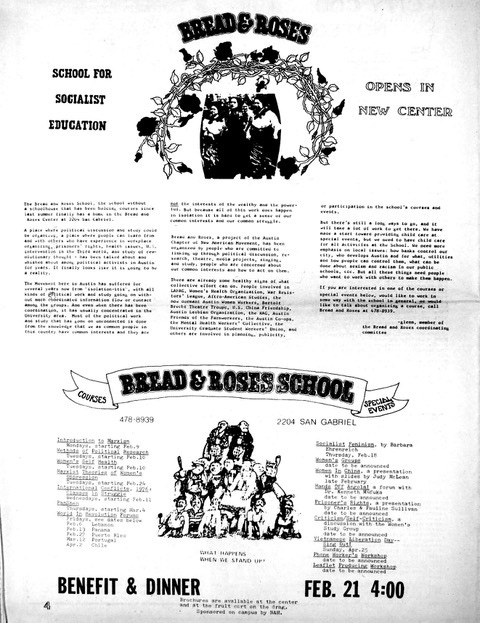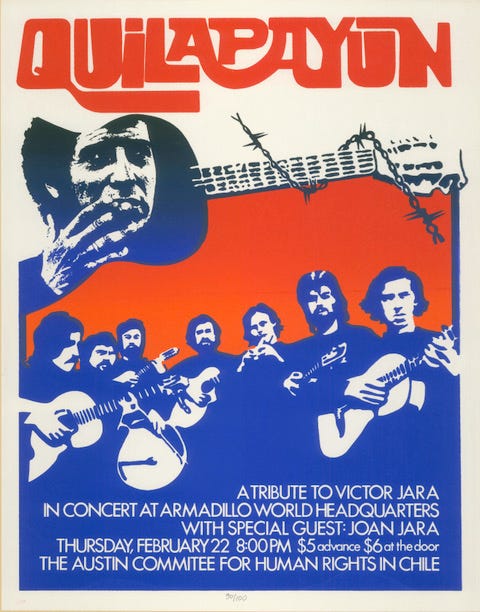In 1976, the Austin chapter of the New American Movement (NAM) opened a community center in the west campus area. Its name was the Bread and Roses School for Socialist Education. One of the project coordinators was Glenn Scott, who was a founder of People’s History in Texas as well.
Bread and Roses looked like a regular house until you walked inside. A Puerto Rican artist Carlos Osorio was artist in residence occupying the front foyer. A small bedroom housed a women’s print shop, the Fly By Night Printing Collective. The press occupied most of the floor space. A NAM member and UT shuttle bus driver, David MacBryde, lived in the back. The living room provided ample room for social gatherings and classes.
A “World Revolution Forum” with sessions devoted to a number of countries including Chile was on the schedule of events. To be clear, in 1976 Chile was a better example of counter-revolution than revolution.
In 1970, Salvador Allende had been elected president of Chile. Allende was a socialist, a doctor, a former senator, and a former cabinet minister who had run for president twice before. During his presidency, Chile made many changes to address poverty, expand national healthcare, empower workers, and transform Chile’s lucrative copper mines from sources of private profit to the national necessities of a socialist democracy.
A socialist victory – by electoral means -- was intolerable to the Nixon administration. The United States spent three years destabilizing the Chilean economy and covertly murdering key allies of the presidency, including military officers who would have supported constitutional democracy.
But, Allende’s government proved more popular in each election cycle. Finally, on September 11, 1973, a military coup took place. The national palace was bombed. A military dictatorship consolidated its power and used economists trained at the University of Chicago, the “Chicago boys” to overhaul the economy, removing the vestiges of social democracy, and privatizing public sector services.
In 1976, with the dictatorship firmly entrenched, there was a gathering at Bread and Roses and a call to action that galvanized Austin solidarity efforts. A Chilean alerted people to an upcoming event at the University of Texas LBJ Library. A conference on “Conflict, Order, and Peace in the Americas,” would include two participants of note. The former CIA Director William Colby would be in attendance as well as a neo-liberal economist, Arnold Harberger, who was one of Chile’s “Chicago Boys.”
A NAM leaflet called for a protest of CIA atrocities at the event. Several people were arrested after mounting the auditorium steps to hold a banner close to William Colby. Another group, seated in the middle of the audience, called for a moment of silence for those who had died in Chile as well as for Orlando Letelier, a former ambassador from Chile, and his colleague, Ronni Moffitt, who had been assassinated by a car bomb in D.C. on October 21, 1976.
The protest and the arrests sparked solidarity efforts in Austin, with the Austin Committee for Human Rights in Chile created as a result. The Chile Committee held regular meetings at Bread and Roses and hosted cultural and educational events there called Peñas, fashioned after the Peña de los Parra in Santiago.
The committee brought Chilean musical groups, who were living in exile, to Austin venues including the Armadillo World Headquarters and Liberty Lunch. The committee carried out boycotts, lobbied Congress, sponsored actions and kept the spirit of Chile solidarity alive until a 1988 plebiscite paved the way back to constitutional democracy.
The 50th anniversary of the military coup in Chile will be September 11, 2023
by Alice Embree






